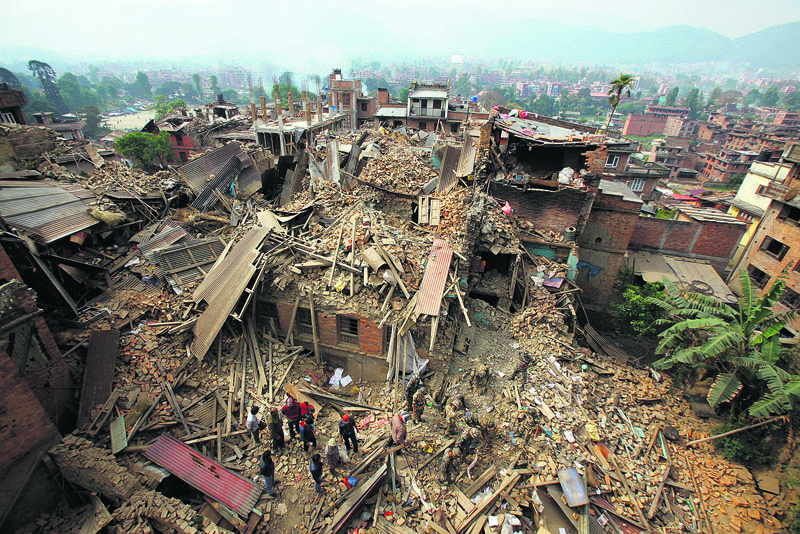
OR

After all, we have been told that it’s not a question of if but when a big one will strike us.
On Tuesday April 25th, we marked two years since the earthquake struck Nepal but, for many of us, it felt a lot longer than just two years ago. We have all settled firmly into our normal routines and all the damage around us, the buildings propped up by support beams, feel like it has always been there. After a tragedy like that there is no small amount of comfort in going back to our daily routines and finding a sense of normalcy that, at some point, is absolutely necessary.
I was working in Mumbai in 2011 when the triple bomb blasts hit the city and I can remember a good proportion of my workplace attempting, rather successfully, to just get on with their daily lives. Depending on what you made of it, it was either the city’s famed resilience at its best or a very blasé attitude to the whole event but for a city that has been repeatedly struck by terrorist attacks getting scared is not an option – not in the hustle and bustle of Mumbai anyway. I suppose in this respect Kathmandu must be like Mumbai only that we must get used to living not under the shadow of terrorism but under the perennial thereat of earthquakes. And with places to go and bills to pay, running scared is not really an option for us either.
In Julius Caesar, Cassius is heard saying to Brutus ‘The fault, dear Brutus, is not in our stars’. In our case, however, the ‘fault’ (line) is part of our destiny. The possibility of an earthquake is always niggling us and there is that disconcerting thought perennially lodged at the back of our minds whenever we step into a ‘historic’ (read unsafe) building, or as we step into elevators or go higher up the floors of the high rises in the capital. After all, we have been told that it’s not a question of if but when a big one will strike us.
Surely, I’m not alone in constantly wondering whether the different buildings I regularly find myself in would be able to withstand an earthquake or not. I work on the fifth floor of what is a poorly constructed building and I know for sure that if an earthquake struck, this is one of the two places that I would hope I’m not in – the other being in a toilet (irrespective of the building).
Jokes aside, if we know that an earthquake is looming then why aren’t we better prepared for it? I don’t want to go into length on how we haven’t learnt our lessons because it has been covered ad infinitum in the mainstream media and news. But when we say ‘we’ haven’t learnt our lessons, people tend to think it’s only the government but it’s also ‘us’ – the general populace who are unprepared when it comes to an earthquake in the near future.
A lot of us work in the ever-increasing number of high rises around the capital that are designed to maximize space and revenue. In these buildings, safety is an afterthought. Most buildings and the offices that they house for, that matter, do not pay any attention to earthquake safety drills or proper evacuation procedures should they be needed. Even more alarming is that a lot of us in Kathmandu work in ‘houses’ that have been repurposed into offices which are not suited for commercial uses thereby increasing the danger from earthquakes.
In schools and hospitals and institutions all over the capital, there are inadequate measures over what to do in case of an earthquake. Just a poster with the name of the ‘meeting point’ and mobile phone number should not be enough. Commercial buildings and offices must be required to plan and practise safety drills to avoid mass panic in the event of an earthquake. Last time around we were lucky in the sense that it was a Saturday because the next time around we might not be so fortunate.
A lot of us in the aftermath of the earthquake pored over CCTV grabs and videos on the internet of not only Nepal but also other earthquake prone countries like Chile and Japan to name a few. The videos of earthquakes in these countries show a certain level of composure among the populace – partly because, like us, they are half expecting earthquakes but more importantly from a sense of belief in their infrastructure, their procedures and preparedness which we lack.
Our extent of preparedness means installing those pretty useless earthquake alarms in our houses and have a tent or ‘tirpal’ ready in the house just in case it strikes again. We have become a lot jumpier now whenever there is the slightest hint of a tremor but barring that it is business as usual. In due course of time, we will forget all about the dangers of the earthquake and when the next one strikes we will be back to where we rightly belong – square one.
The writer loves traveling, writing, and good food when he is afforded an escape from the rat race. He can be contacted at gunjan.u@gmail.com
You May Like This

Not our fault
Women are expected to “avoid the situations” and to remain within “their boundaries”. ... Read More...

Fault in my stars
I wished upon a shooting star for you to be mine You went light years away from me in no... Read More...

Our Nepal, Our Pride
Our heaven on Earth, Nepal, our Pride, Our domicile of God is free as infinite As the sun’s portentous rays... Read More...

Just In
- World Malaria Day: Foreign returnees more susceptible to the vector-borne disease
- MoEST seeks EC’s help in identifying teachers linked to political parties
- 70 community and national forests affected by fire in Parbat till Wednesday
- NEPSE loses 3.24 points, while daily turnover inclines to Rs 2.36 billion
- Pak Embassy awards scholarships to 180 Nepali students
- President Paudel approves mobilization of army personnel for by-elections security
- Bhajang and Ilam by-elections: 69 polling stations classified as ‘highly sensitive’
- Karnali CM Kandel secures vote of confidence


















Leave A Comment